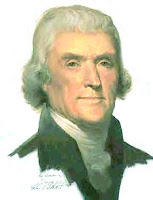He is also the author of a newly released book, In Search of Self-Governance.
“Self-governance is about far more than politics and government,” says Rasmussen. “It requires a lot of the American people, and it has nothing to do with the petty partisan games played by Republicans and Democrats. Unfortunately, even after more than 200 years of success, there is an urgent need to defend this most basic of American values.”
This is a principle to which President Obama sometimes pays lip service, indicating that he understands that many Americans believe in this understanding of liberty. He just doesn't share that belief. Neither does most of his party. In their view, good government is government that relieves you of the burden of self-governance. In fact, they appear to believe that "self-governance" and "liberty" are just arrangements by which the rich and powerful exploit the poor and helpless. That's why we need big government.
In his recent analysis of the President's State of the Union address, George Will ("Faux Contrition: Obama Blames the Public") points out how the president looked down on the poor gammas and deltas who make up most of the American people (whom he regards also with an aspect of pity on account of our heart rending stories).
Acknowledging that the longer the public has looked at the legislation the less the public has liked it, he blamed himself for not "explaining it more clearly." But his faux contrition actually blames the public: The problem is not the legislation's substance but the presentation of it to slow learners. He urged them to take "another look at the plan we've proposed."
In his infinite mercy, the president will draw on his truly unprecedented logical and rhetorical abilities and make another attempt to explain the self-evident virtues of his health care reform plan (which he called a plan, even though there are two very different plans, as Will points out).
Not only is President Obama frustrated by our increasingly irksome insistence on retaining a role for ourselves in the government of our personal affairs (everything from choice of doctors to choice of light bulbs), he is also annoyed by having to share power not only with another political party, but also with two other branches of government. Will sees this attitude encapsulated in a phrase Obama used last night: the "weight of our politics."
Obama seems to regret the existence in Washington of...everyone else. He seems to feel entitled to have his way without tiresome interventions in the political process by the many interests affected by his agenda for radical expansion of the regulatory state.Yet despite this annoyance with how the gears of Washington slow the advance of progress and defer our hopes, Washington (not even state government) is always the answer.
Obama's leitmotif is: Washington is disappointing, Washington is annoying, Washington is dysfunctional, Washington is corrupt, verily Washington is toxic -- yet Washington should conscript a substantially larger share of GDP, and Washington should exercise vast new controls over health care, energy, K-12 education, etc.
What is false is ultimately incoherent. The truth is always consistent with itself.
Addendum:
Peter Wehner's analysis is along the same lines as Will's, but much more thorough in exposing what he calls "A Self-Referential State of the Union Address."
It was one of the worst State of the Union addresses in modern times – a stunning thing for a man who won the presidency in large measure based on the power and uplift of his rhetoric. ... The speech was defensive and petulant, backward-looking and condescending, petty and graceless. He didn't persuade people; he lectured them. What was on display last night was a man of unsurpassed self-righteousness engaged in constant self-justification. His first year in office has been, by almost every measure, a failure – and it is perceived as a failure by much of the public. Mr. Obama cannot stand this fact; it is clearly eating away at him.
Perhaps I'm reading too much into her expressions, but Michelle seemed to reflect the same attitude up in the balcony. This is the woman who was proud of her country for the first time in her life only when it was fawning over her husband in large numbers. Now that it's turning against his policies (though not necessarily against him personally), she's bitter again.
He also echoed the irony that Will highlighted: "And even as he castigated Washington for being "unable or unwilling to solve any of our problems," he continued to champion an agenda that would concentrate unprecedented power there."









